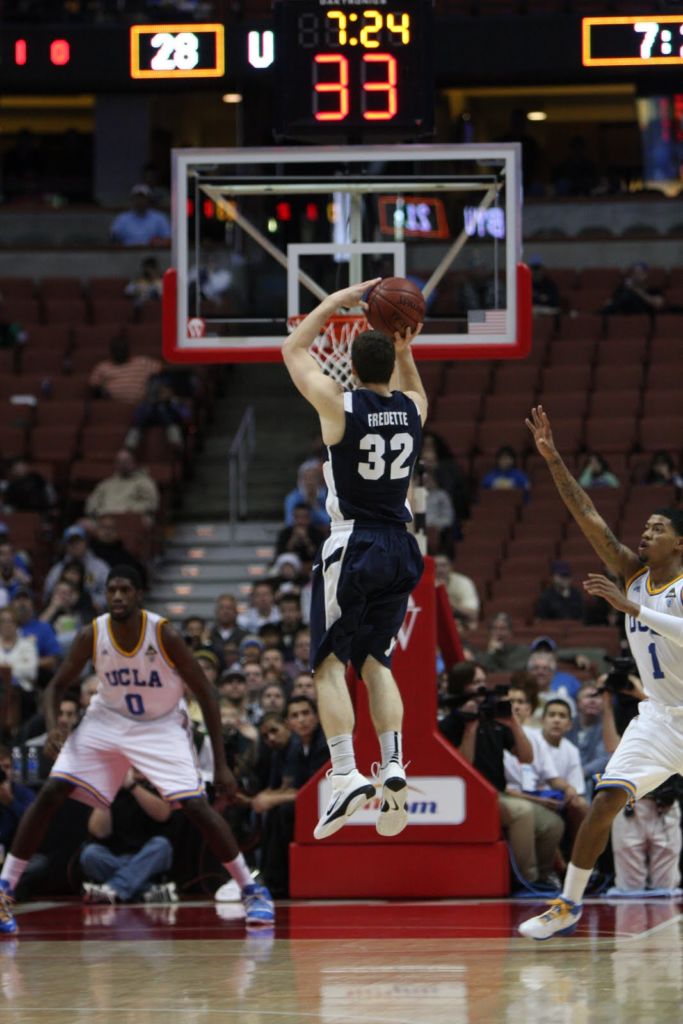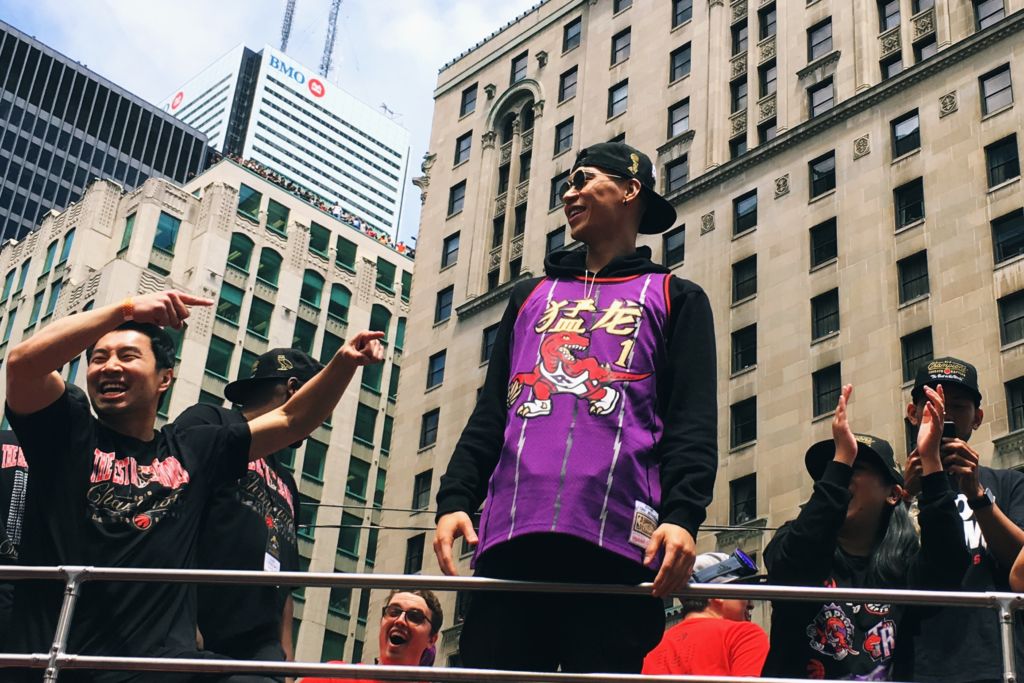The Chinese Basketball Association is not the top league outside North America, but it draws former NBA and NCAA stars nonetheless.
As the first quarter came to a close, the China Central Television broadcast zoomed in, focusing on a bead of sweat dripping from Marcus Georges-Hunt’s beard. His game highlights flashed on screen — a step back 3-pointer to extend Guangzhou’s lead to five, a dive for a loose ball that deflected off his opponent and out-of-bounds, a collected rebound and fast break up the court. When the break ended, the camera continued to rest on Hunt. The former Georgia Tech and Minnesota Timberwolves guard played 44 of 48 minutes in the Loong Lions’ first game back from the Chinese Basketball Association’s COVID-19 pause. Guangzhou’s North American import carried his team to a 16-point victory, leading the team with 47 points and 12 rebounds, making 69% of his shots, and shooting 57% from beyond the arc.
Not all of the CBA’s 20 teams play the isolated basketball style that allows imported stars to “jack up 30 to 40 shots a game,” said Sports Illustrated Senior Writer Alex Prewitt. But for those that do, former NCAA talent and NBA castoffs often enjoy free reign in playing iso ball — which lends itself well to creating a new path to stardom. Teams and fans expect foreign players to lead their teams in scoring or rebounding, said Xinjiang Flying Tigers Associate Head Coach Mark Amaral, and, if successful, business and brand opportunities await.
“A combination of lifestyle, short seasons, salary, and the business opportunities that some guys see over in China,” Prewitt said. “It adds up to sort of an irresistible deal.”
With his team down seven, Kyle Fogg, one of the highest scoring current CBA imports, poked the ball free in the key and snatched it with both hands, pulling it into his body. As the white Shandong Heroes jerseys swarmed him, the former Arizona Wildcat thrashed back and forth trying to break free, only to be saved by the referee’s whistle — “reach-in foul,” called the ref. From the sideline, Beijing head coach Stephon Marbury called out a play: “Four, Four,” he yelled, before bringing Fogg and the rest of his players in for a fourth-quarter timeout.
Those who have watched the migration of basketball to China consider Marbury the pinnacle, the first to seize the “irresistible deal” in 2010 when he signed with the Shanxi Zhongyu Brave Dragons and sparked a flashpoint for second careers in China. The two-time NBA all-star parlayed three CBA championships into a rabid local fan base, the key to the city of Beijing, a green card, a museum dedicated to him, bronze immortalization, a self-starred autobiographical musical, and now a head coaching job with one of his former teams. “Marbury showed other players what is possible,” Prewitt said. “What the highest that you can possibly achieve would be, as unattainable as that is for some guys.”
“Marbury showed other players what is possible; what the highest that you can possibly achieve would be, as unattainable as that is for some guys.”
– Alex Prewitt
Though basketball players turned Chinese stars followed him, Marbury’s icon status serves as the apex, not the norm. In fact, while many American imports earn a dedicated interpreter, personal driver, five-star suite, and six-figure pay-day — even at the low-end, Prewitt said — brand development and off-court endorsements are no certainty. Business success — most commonly athletic apparel endorsements, said founder of China-focused sports agency ALTIUS Matt Beyer — requires league success and commitment to the local community and culture. Only after two seasons of 29+ points per game, a CBA MVP, and regular season championship, did Beyer’s client Courtney Fortson sign a two-year endorsement deal with Chinese sports goods supplier 361°. “I would say the average import would go over and collect a nice fat check for a couple of months and then get cut,” Prewitt said.
Chinese fans, like North American basketball fans, have a strong affinity for local players, and the CBA’s most popular stars are not foreign imports, but the Chinese national team players, said Chinese sports columnist Jonty Dixon. Despite fans “accepting the foreign players are better than the Chinese players,” some imports remain anonymous during their time on Chinese courts. Even for the newest Beijing Duck, Jeremy Lin — a former New York Knick, NBA Champion, Asian-American icon, and architect of Linsanity — there is no guaranteed success, Dixon said.
Even the CBA rules attempt to limit the influence of imported players, confining each team to just two imports and allowing them to play only six quarters per game combined. When they’re on the court they are expected to score, not pass, said Amaral. But, according to Dixon, being “the guy” in the CBA isn’t easy anymore, as the league has gotten progressively tougher in recent years — the number of 30-point scorers has decreased in each of the past three CBA seasons. Players expecting to casually dominate the league will have a “nasty surprise,” he said.
Former Denver Nugget Ty Lawson was one import who did, however, dominate. Lawson averaged more than 26 points and seven assists per game across three CBA seasons. The eight-year NBA veteran, who put up with constant elbows thrown his way in the paint — the CBA is known for extreme physical play, especially to foreign players, Prewitt said — earned the respect of teammates, opponents, and refs, and used his time in China to create a slipper company: Sleakers. As he worked to launch the company, Lawson visited the slipper factory on off days, posted new releases on his social media, and worked with a Chinese production team to “get the price point a little bit lower.” But without his NBA pedigree and CBA performance to back it up, Lawson could’ve become another import who cycles in and out of the CBA every year. League windows allow teams to release imports with ease throughout the season, but once you’re an established commodity, Prewitt said, you’re in.

But to establish yourself, players must possess abilities beyond the court. Every season a new well-known former NBA guy makes it to the league, Amaral said, imports must find other ways — beyond gaudy statlines — to differentiate themselves. Marbury didn’t reach “god-like” status because of his 20 points per game. As a former All-NBA talent, that was expected. Fans embraced Marbury because he embraced them and the country, said Mae Yue, sports reporter for The Shanghai Daily.
When Jimmer Fredette first arrived in China, set to play for Shanghai Sharks, there was no one there to greet him, Prewitt said. Fredette scored 28.9 points per game in his final season at Brigham Young University, led the Cougars to the 2011 Sweet 16 during a run known as Jimmermania, and was drafted 10th overall in the 2011 NBA Draft, yet the people of Shanghai had no idea who he was. In his first CBA game, Fredette scored 42 points alongside one assist and two rebounds. The guard led his team with 37 points per game and scored the second-most points in a single contest in CBA history (75). Before earning a contract with the Suns to return to the NBA, Fredette received daily gifts from fans that filled his apartment, signed a $345,000 shoe deal, and became one of the most popular players in the league, Yue said.
Fredette’s Weibo, a Chinese social media site and app, attracts more than 480,000 fans who followed his exploration of Shanghai and China with his family, interaction with teammates at All-Star events, and even a shout-out from Kobe Bryant after Fredette’s record setting game. Though language is often one of the biggest barriers for foreign players, said agent Beyer, the apps and social media ease societal integration.

With Fredette now playing with the top-tier Greek Basket League’s Panathinaikos B.C. after a failed second stint in the NBA and Marbury coaching from the sideline, Dixon expects Lin to take over the role as ‘the guy.’ After playing an end-of-bench role for the NBA champion Toronto Raptors in 2019, Lin sought a chance to extend his career, a common theme in those who arrive from abroad to the CBA, and has become an instant celebrity. While local stars usually sell the most jerseys and posters, Lin is the focus for the Ducks, Dixon said, and his Taiwanese heritage makes him a special case. With the Beijing Ducks on the road, a fan approached the nine-year NBA veteran and handed over a bottle of moisturizer — they had seen that Lin’s hands were dry on one of his instagram posts, Prewitt said. The South China Morning Post estimated Lin would have “countless commercial opportunities … in China,” before he even arrived.
But even as Lin leads the fourth-placed Ducks on and off the court, he may be one of the league’s last imported stars. In recent years, the CBA has begun to distance itself from the import system. After a disastrous 2019 FIBA World Cup, where China hosted but finished 24th, Chinese basketball legend and CBA commissioner Yao Ming aims to use the CBA as a venue to grow local talent — not support foreign basketball and business endeavors — moving away from the import-dominated ‘one-on-five’ basketball some teams utilize. Heading into the 2020-21 season, before COVID-19 changed the CBA and every major sports league’s plans, Ming introduced new rules that would limit imports playing time and earning potential. The policy allowed for only one foreign player on the court at any given time, and it implemented an import salary cap of around $5.1 million as part of a “broader push to try to grow more Yao Mings,” Prewitt said.
“[The goal is to] really bring Chinese basketball to where everybody thought it was going to be 10, 15 years ago,” Prewitt said. “After Yao came to the NBA.”
Barring a complete ban on imports, the value of travelling to — and succeeding in — the CBA lies as much in off-court opportunity as with salary or playing time. Players may not reach the status of Marbury, or even Fredette and Lawson, but the path is cleared. “There’s an insatiable appetite for basketball in that country,” Prewitt said. “The guys who are successful over there realize that and capitalize on it.”
Header image courtesy of Unsplash.

